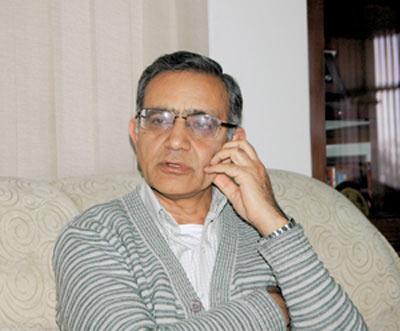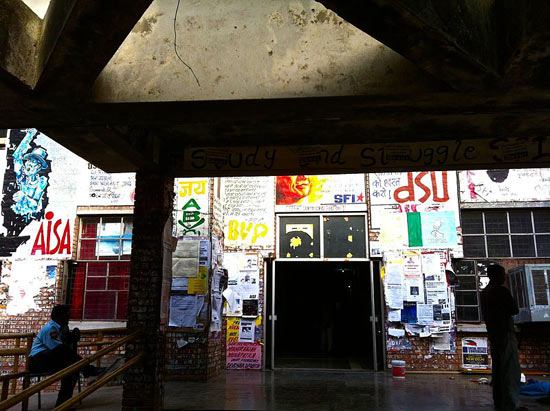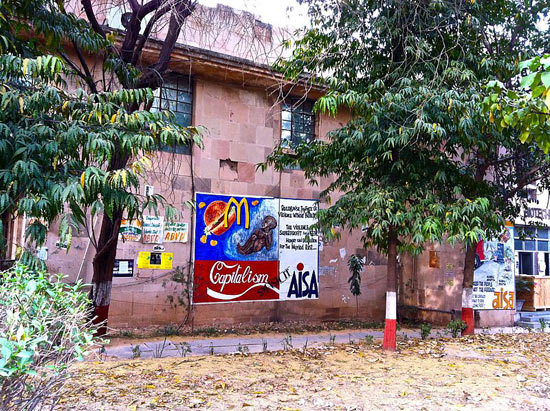Shiphony Pavithran Suri, Careers360
For Dr S K Sopory, vice chancellor, Jawaharlal Nehru University, talks about his vision, student experiences and reveals the aspirations of a cobbler's son who is a PhD scholar at JNU.
When you walk into to the office of Dr S K Sopory, VC of Jawaharlal Nehru University (JNU), what holds your attention is the informal feel inside the room.
He is seen calmly signing off documents by the window side without blocking the sun light.
He says modestly, "I don't like to sit on my well cushioned VC seat, rather this small table and chair with no electric lights on, it gives me space to think."
Unlike many bureaucratic VCs, Sopory is seen as the most mobile VC who reaches out to students every Saturday to solve their academic issues.
He talks about his vision, student experiences and reveals the aspirations of a cobbler's son who is a PhD scholar at JNU.
Sopory says, "I can go on for fee hike like other universities -- but I don't want to eliminate students who are in need of real education."
Please click NEXT to continue reading...
'At JNU, learning process doesn't end in the classroom'
Image: A mural of Bhagat Singh adorns the JNU campus wallPhotographs: Manuel Menal/Wikimedia Commons
In what context you will call JNU a liberal university?
One, teachers and students are free to express their views.
Second, JNU fulfils the social commitment by calling people from all walks of life.
We want to achieve all inclusiveness and excellence, followed by openness.
JNU focuses on interdisciplinary approach on research and education.
We are unique in the sense that we do not revolve around any specific defined course curriculum for teaching.
We don't follow the pattern where somebody else prepares curriculum and you teach. At JNU, the learning process doesn't end in the classroom.
You also learn about other subjects rather than just your own -- with the help of university discussions, seminars, plays, conferences. JNU has openness in everything, from expressing your thoughts in academics to teachers.
JNU is notorious for protests. Do you face deadlocks in the campus?
JNU is a place where everybody has the right to express themselves in any topic so long as there is no disturbance to the academics.
If somebody calls for a lecture in any hostel then I have no problem.
When they come to me for hunger strike or other demonstration -- I encourage them to go ahead as long as they don't disturb rest of the students in the classrooms.
About 90 per cent students are doing their jobs -- they are busy learning and teaching.
There are some groups who probably want to make a career out of politics. Why to stop them?
I tell them to become good leaders and not be followers all life.
But if you just go and become a party member and keep roaming around here and there, then you are not doing anything for the betterment of the country.
We did not have student elections for three years. I started it after my arrival -- I am happy when students express their opinion.
'We must be able to convert knowledge into product'
Image: School of languages, JNU, New DelhiPhotographs: Subhashish Panigrahi/Wikimedia Commons
In your opinion, what's the real spirit of education?
Education is empowerment. For me it is an art of living -- something which can teach you how to live life.
In the current context, education is linked to employability alone. But I strongly feel that education is beyond employment.
If you have internalised education well, then it empowers your mind to serve the society in a different way.
Research is not an end in itself. Why do enormous researches still lag behind internationally?
I strongly feel that we must be able to convert knowledge into product. Now this is what we are trying to focus on.
And for that you have to either sell the patent or partner with them and convert your knowledge into a value-added product.
Your innovative research should aim towards solving certain problems of societal issues.
Has JNU lost its sheen in terms of security, quality students and research output?
There are some odd rare cases. Students work in laboratories late at night. It is as safe as before.
What worries me is the level of academics. It is slightly going down -- in terms of quality and quantity. I expect that our research should be read by the best.
Somebody should be able to use my research work to take forward his research. We have to increase our citations.
In our science school, our index for all the publications is more than 44. Even in social sciences, some of the books which people publish are very well recognised.
Recently, one of our faculties was felicitated with the Padmashree for developing a dictionary of the Andamenese language.
In any system, there are about 10-15 per cent people to whom whatever you give -- they will not produce.
The other group is 15-20 per cent who will always be on top in terms of producing good work.
And the other is 30 per cent who can do but are not working in that direction. So my current attention is to push their personal zeal, encourage them to do what they really can do.
Facilities-wise they should not feel hampered. They must be given the best academic ambience -- a good fertile land to sow your ideas!
'I don't think uniformity is good in education system'
Image: Biotechnology Department, Jawaharlal Nehru University, DelhiPhotographs: Psubhashish/Wikimedia Commons
How will you rate the quality of education at JNU with others?
When I joined, I told the council members that we should get ourselves evaluated from outside.
I finally got the approval from the academic council to get ourselves accredited through National Accreditation Authority.
The accreditation authority themselves were worried because JNU is a place where high standing scholars exist.
They sent a 70-member committee which is one of the largest committees ever sent to a university. They spent three days.
According to that evaluation report, JNU is Number 1 in the country.
Out of four, we have got a score of 3.91. UGC has also mentioned that from this viewpoint JNU is Number 1.
How does it feel to be on top?
I am happy but not satisfied. I am happy that we are number one but I want to compare our JNU standards with world universities.
I don't think uniformity is good in education system.
I feel you have to strive for the best, as you are never the best. Somebody is always better than you. You have to march on, keep striving.
We have had great institutions like JNU, IIT, IISc. Why can't we stop socio-economic decline in our country?
Education is all about how to reach out to people who have an ambition to get educated.
At JNU, out of one lakh applicants we admit only 2000. And all the central universities together educate about one lakh students.
An uneducated person has a lot more avenues than a highly qualified person.
Supposing you become highly specialised in the area of physics with post doctoral degree -- your options are so limited that you can't get employment.
But if you have done MBA -- you have wider options. Sometimes specialisation limits your options. Of course, when you get it then you are at a higher level.
From a biologist to university VC, what makes you moving?
Of course, students. My Saturday meetings with some students helps me helps me get closer to experience their drive.
They discuss several issues -- non-approval of thesis, not liking teachers, books not getting available on time, funds to participate in international conferences.
I want to take them forward to reach the pinnacle of excellence and get them jobs.
A physically challenged student used to sell chole in trains to earn money. I can go on for fee hike like other universities -- but I don't want to eliminate those who are in need of education.
We have to think about this class of students.
There is a student whose father is a cobbler, he has reached the level of PhD (thesis on human rights). I asked him what you want to be.
He said, 'I want to be in UN and serve our country.'
If 10 students like him reach some level, then I feel that JNU has served some purpose. It is a great task because there are millions out there!





Comment
article